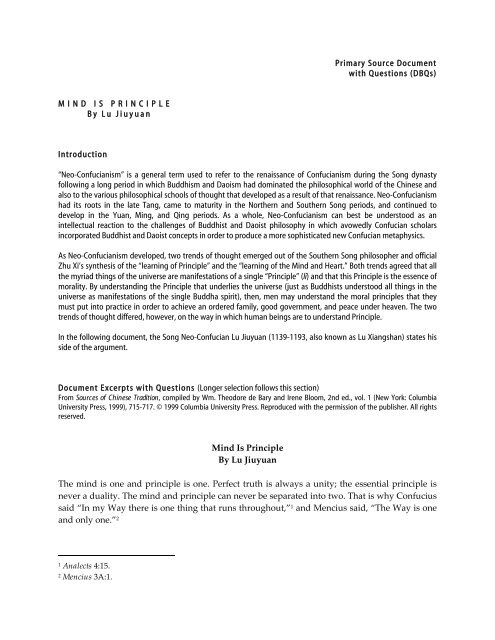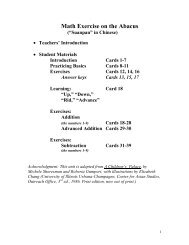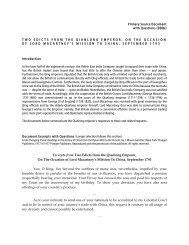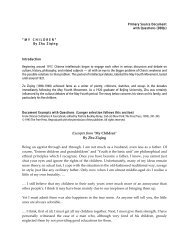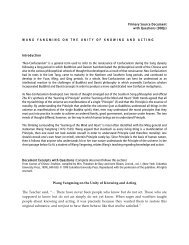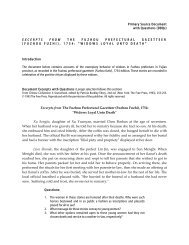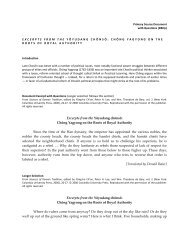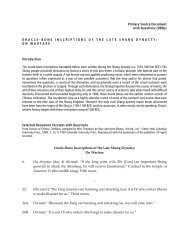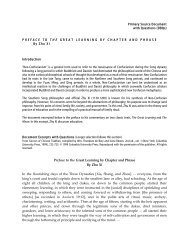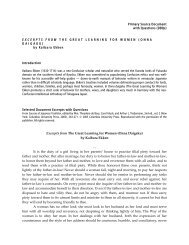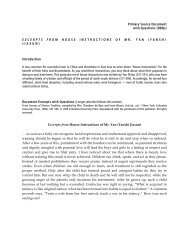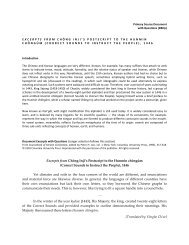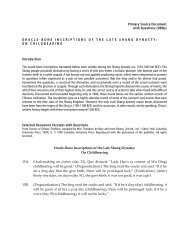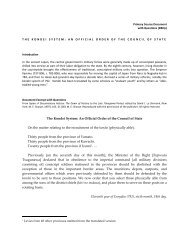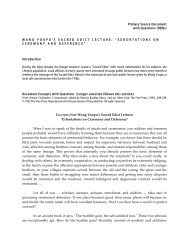Mind Is Principle - Asia for Educators - Columbia University
Mind Is Principle - Asia for Educators - Columbia University
Mind Is Principle - Asia for Educators - Columbia University
You also want an ePaper? Increase the reach of your titles
YUMPU automatically turns print PDFs into web optimized ePapers that Google loves.
Primary Source Documentwith Questions (DBQs)MIND IS PRINCIPLEBy Lu JiuyuanIntroduction“Neo-Confucianism” is a general term used to refer to the renaissance of Confucianism during the Song dynastyfollowing a long period in which Buddhism and Daoism had dominated the philosophical world of the Chinese andalso to the various philosophical schools of thought that developed as a result of that renaissance. Neo-Confucianismhad its roots in the late Tang, came to maturity in the Northern and Southern Song periods, and continued todevelop in the Yuan, Ming, and Qing periods. As a whole, Neo-Confucianism can best be understood as anintellectual reaction to the challenges of Buddhist and Daoist philosophy in which avowedly Confucian scholarsincorporated Buddhist and Daoist concepts in order to produce a more sophisticated new Confucian metaphysics.As Neo-Confucianism developed, two trends of thought emerged out of the Southern Song philosopher and officialZhu Xi’s synthesis of the “learning of <strong>Principle</strong>” and the “learning of the <strong>Mind</strong> and Heart.” Both trends agreed that allthe myriad things of the universe are manifestations of a single “<strong>Principle</strong>” (li) and that this <strong>Principle</strong> is the essence ofmorality. By understanding the <strong>Principle</strong> that underlies the universe (just as Buddhists understood all things in theuniverse as manifestations of the single Buddha spirit), then, men may understand the moral principles that theymust put into practice in order to achieve an ordered family, good government, and peace under heaven. The twotrends of thought differed, however, on the way in which human beings are to understand <strong>Principle</strong>.In the following document, the Song Neo-Confucian Lu Jiuyuan (1139-1193, also known as Lu Xiangshan) states hisside of the argument.Document Excerpts with Questions (Longer selection follows this section)From Sources of Chinese Tradition, compiled by Wm. Theodore de Bary and Irene Bloom, 2nd ed., vol. 1 (New York: <strong>Columbia</strong><strong>University</strong> Press, 1999), 715-717. © 1999 <strong>Columbia</strong> <strong>University</strong> Press. Reproduced with the permission of the publisher. All rightsreserved.<strong>Mind</strong><strong>Is</strong><strong>Principle</strong>ByLuJiuyuanThemindisoneandprincipleisone.Perfecttruthisalwaysaunity;theessentialprincipleisneveraduality.Themindandprinciplecanneverbeseparatedintotwo.ThatiswhyConfuciussaid“InmyWaythereisonethingthatrunsthroughout,” 1 andMenciussaid,“TheWayisoneandonlyone.” 2 1Analects4:15.2Mencius3A:1.
Primary Source Document, with Questions (DBQs) on MIND IS PRINCIPLE, BY LU JIUYUAN…TheTeachersaidthatthemyriadthingsexistluxuriantlyinthemind.Whatpermeatesthemindand,pouring<strong>for</strong>th,extendstofilltheuniverse,isnothingbutprinciple.TheTeacheralwayssaidthatoutsidetheWaytherearenoeventsandoutsideeventsthereisnoWay.…… Most interpreters have explained the human mind [which is liable to make mistakes] asequivalenttohumandesiresandthemindoftheWay[whichfollowsmorallaw]asequivalenttothe<strong>Principle</strong>ofHeaven.Thisinterpretationiswrong.Themindisone.Howcanahumanbeinghavetwominds?Questions:1. If the mind and principle are one, how then does one go aboutunderstanding principle (which is morality)?2. What implications might Lu Jiuyuan’s understanding of the relationbetween the human mind and the <strong>Principle</strong> of Heaven have <strong>for</strong> the authorityof imperial laws?3. What implications might Lu Jiuyuan’s understanding of the relationbetween the human mind and the <strong>Principle</strong> of Heaven have <strong>for</strong> everydaybehavior?Longer SelectionFrom Sources of Chinese Tradition, compiled by Wm. Theodore de Bary and Irene Bloom, 2nd ed., vol. 1 (New York: <strong>Columbia</strong><strong>University</strong> Press, 1999), 715-717. © 1999 <strong>Columbia</strong> <strong>University</strong> Press. Reproduced with the permission of the publisher. All rightsreserved.<strong>Mind</strong><strong>Is</strong><strong>Principle</strong>ByLuJiuyuanMenciussaid,“Thatwhereinhumanbeingsdifferfromthebirdsandanimalsisbutslight.Themultitudeofpeoplerelinquishit,whilethenoblepersonretainsit.” 3 Whatisrelinquishedisthemind. That is why Mencius said that some people “lose their original mind.” 4 What is to bepreservedisthemind.ThatiswhyMenciussaid,“thegreatmanishewhodoesnotlosethemind of a newborn babe.” 5 [What Mencius referred to as] the four sprouts [of pity and 3Xiangshanq uanji35:10a.4Mencius4B:19.5Mencius4B:12.<strong>Asia</strong> <strong>for</strong> <strong>Educators</strong> | <strong>Columbia</strong> <strong>University</strong> | http://afe.easia.columbia.edu Page 2 of 4
Primary Source Document, with Questions (DBQs) on MIND IS PRINCIPLE, BY LU JIUYUANcompassion,shameandaversion,modestyandcompliance,andthesenseofrightandwrong]arethismind.ItiswhatHeavenhasendowedinus.Allhumanbeingshavethismind,andallmindsareendowedwiththisprinciple.Themindisprinciple.Theaffairsoftheuniversearemyownaffairs;myownaffairsaretheaffairsoftheuniverse.Thehumanmindismostintelligent,andprincipleismostclear.Allpeoplehavethisinmindandallmindscontainthisprincipleinfull.The four directions and upward and downward constitute the spatial continuum. What hasgonebyinthepastandwhatistocomeinthefutureconstitutethetemporalcontinuum.Thesecontinua,ortheuniverse,aremymind,andmymindistheuniverse.Sagesappearedtensofthousands of generations ago. They shared this mind; they shared this principle. Sages willappeartensofthousandsofgenerationstocome.Theywillsharethismind;theywillsharethisprinciple.Overthefourseassagesappear.Theysharethismind;theysharethisprinciple.Themindisoneandprincipleisone.Perfecttruthisalwaysaunity;theessentialprincipleisneveraduality.Themindandprinciplecanneverbeseparatedintotwo.ThatiswhyConfuciussaid,“InmyWaythereisonethingthatrunsthroughout,” 6 andMenciussaid,“TheWayisoneandonlyone.” 7 [QuotingConfucius,]Menciusalsosaid,“Therearejusttwoways:beinghumaneandbeinginhumane.”8 Toactinacertainwayishumaneness.Nottoactinacertainwayistheoppositeofhumaneness.Humanenessisthemind,theprinciple.“Seekandyouwillgetit” 9 meanstogetthisprinciple.“Thosewhoarefirsttoknow”knowthisprinciple,and“thosewhoarefirstawakened” 10 areawakenedtothisprinciple.Itisthisprinciplethatconstituteslove<strong>for</strong>parents,reverence<strong>for</strong>elders,andthesenseofalarmandcommiserationwhenonesees achildabouttofallintoawell.Itisthisprinciplethatmakespeopleashamedofshamefulthingsandhatewhatshouldbehated.Itisthisprinciplethatenablespeopletoknowwhatisrighttoberightandwhatiswrongtobewrong.Itisthisprinciplethatmakespeopledeferentialwhendeference is due and humble when humility is called <strong>for</strong>. Reverent seriousness (jing) is thisprinciple; rightness is this principle. And what is internal and what is external are all thisprinciple. … Mencius said, “What people are able to do without having learned it is innateability. What they know without having to think about it is innate knowledge.” 11 These areendowedinusbyHeaven.“Wedefinitelypossessthem…theyarenotinfusedintousfrom 6Seefootnote1,above.7Seefootnote2,above.8Mencius4A:2.9Mencius6A:6.10Mencius5A:7.11Mencius7A:15.<strong>Asia</strong> <strong>for</strong> <strong>Educators</strong> | <strong>Columbia</strong> <strong>University</strong> | http://afe.easia.columbia.edu Page 3 of 4
Primary Source Document, with Questions (DBQs) on MIND IS PRINCIPLE, BY LU JIUYUANwithout.” 12 There<strong>for</strong>eMenciussaid,“Allthetenthousandthingsarecompleteinme.Toturnwithintoexamineoneselfandfindthatoneissincere‐‐thereisnogreaterjoythanthis.” 13 TheTeachersaidthatthemyriadthingsexistluxuriantlyinthemind.Whatpermeatesthemindand,pouring<strong>for</strong>th,extendstofilltheuniverse,isnothingbutprinciple.TheTeacheralwayssaidthatoutsideoftheWaytherearenoeventsandoutsideofeventsthereisnoWay.ThetheorythatprincipleisduetoHeavenwhereasdesireisduetohumanbeingsis,surelynotthebestdoctrine.IfprincipleisduetoHeavenanddesireduetoman,thenHeavenandhumansmustbedifferent.ThistheorycanbetracedtoLaozi.The“RecordofMusic”says,“Bynatureahuman being is tranquil at birth. When influenced by external things, he begins to be active,whichisdesirearisingfromhisnature.Asonebecomesconsciousofthingsresultingfromthisimpact,onebeginstohavelikesanddislikes.…When[asaresultoftheselikesanddislikes]oneisunabletoreturntohisoriginalmind,the<strong>Principle</strong>ofHeavenisdestroyed.” 14 Hereistheorigin of the theory that principle is from Heaven whereas desire is from humans. And thewords of the “Record of Music” are based on the Daoists. If it is said that only tranquility isinbornnature,isactivitynotinbornnaturealso?ItissaidintheClassicofDocumentsthat“thehumanmindisprecarious,themindoftheWayissubtle.” 15 Mostinterpretershaveexplainedthe human mind [which is liable to make mistakes] as equivalent to human desires and themind of the Way [which follows moral law] as equivalent to the <strong>Principle</strong> of Heaven. Thisinterpretationiswrong.Themindisone.Howcanahumanbeinghavetwominds? 12 Mencius 6A:6. Mencius refers here to humaneness, rightness, ritual decorum, and wisdom. In this“quotation,”LuJiuyuanreversestheorderofthetwoclauses.13Mencius7A:4.14“RecordofMusic,”RecordofRites;seeJamesLegge,LiKi(Li‐chi).BookofRites,vol.2(Ox<strong>for</strong>d:SacredBooksoftheEast,1885;reprint,NewYork:<strong>University</strong>Books,1967),96.15 “Counsels of the Great Yu,” Classic of Documents; see James Legge, The Chinese Classics, vol. 3(Ox<strong>for</strong>d:ClarendonPress,1893‐1895;reprint,HongKong:HongKong<strong>University</strong>Press,1979),61.<strong>Asia</strong> <strong>for</strong> <strong>Educators</strong> | <strong>Columbia</strong> <strong>University</strong> | http://afe.easia.columbia.edu Page 4 of 4


